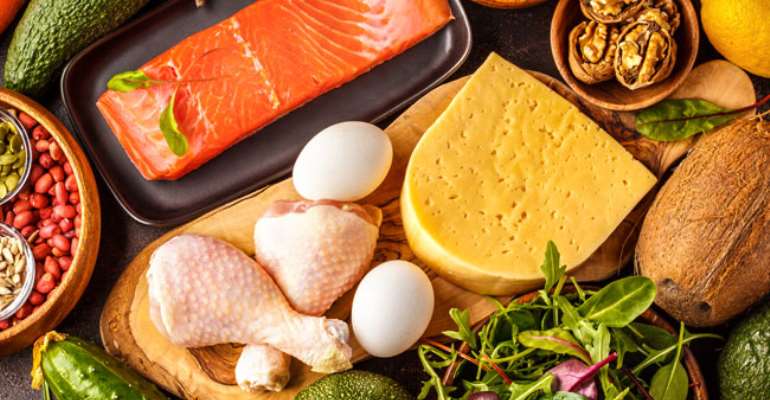
What is the keto diet?
The ketogenic diet has gained massive popularity in the pursuit of weight loss many at times promoted by some quack professionals. It is a composite diet pattern that is very low in carbohydrates, very high in fats and relatively high in protein. Largely in the ketogenic diet, 70-80% of total daily calorie comes from fat, 5-10% from carbohydrate, and 10-20% from protein. Typically, the ketogenic diet reduces total carbohydrate intake to less than 50 grams per day and this can be as low as 20 grams per day. For example, a 2000 calorie diet would have to contain a maximum of 50 g carbohydrates, a minimum of 155g fat and a minimum of 100g protein.
Although many variations of the ketogenic diet exist, all forbid carbohydrate-rich foods including but not limited to grains, cereals, pasta, rice, and cookies; potatoes, corn, vegetables and fruits, and fruit juices even including 100% fruit juices. Most ketogenic diet plans allow foods high in saturated fat, such as fatty cuts of meats, processed meats, lard, and butter, as well as sources of unsaturated fats, such as nuts, seeds, avocados, plant oils, and oily fish.
What is the premise?
When on the “prudent diet”, the concentration of ketone bodies in the blood is less than 0.3 mM. Until the concentration of ketone bodies reaches 4 mM the central nervous system and some tissues cannot use ketone bodies as their main energy source but glucose only. The main idea of the ketogenic diet is to induce and maintain long term “physiological ketosis” of an increased circulating ketone bodies between 4 to 8 mM to induces the central nervous system and other tissues which have the 3-ketoacyl CoA transferase enzyme, to use ketone bodies (acetoacetate and β-hydroxybutyrate) instead of glucose as their main source of energy.
Spontaneously and consequently, the body switches from use of glucose to fat for energy or ATP through the ceaseless breakdown fat to form the ketone bodies in maintaining that constant concentration of 4 to 8 mM of ketone bodies in circulation. Due to the exceedingly low dietary intake of carbohydrates, the glucose-dependent cells such as the red cells obtain glucose from gluconeogenesis. Due to gluconeogenesis blood glucose concentration in the blood do not fall below the physiological range.
Physiological ketosis versus ketoacidosis
Ketone bodies have lower pH and can lower blood pH to a level that can be life-threatening. Nevertheless, the body has a wonderful buffer system or an acid-base balance system involving the renal and respiratory systems to ensures that blood pH is not altered. Ketoacidosis may only occur when this buffer system is overwhelmed such that the ketone bodies level rise in the blood above 15 mM. These occur oftentimes only in diabetic ketoacidosis and alcoholic ketoacidosis and does not and cannot occur as a result of the ketogenic diet.
The belief or conviction by some persons whether clinicians or not that ketogenic diet may cause ketoacidosis is absolutely incorrect. The ketogenic diet induced-ketosis is called physiological ketosis. Others prefer to call it nutritional ketosis. In either case, ketone bodies rise to a maximum of 8 mM and not above 15 mM. This form of a rise in ketone bodies is not enough to overwhelm the body’s acid-base balance system explaining why ketoacidosis cannot occur and hence the name physiological ketosis. Ketosis which occurs when on the ketogenic diet and ketoacidosis which occurs in some disease states are not interchangeable.
So, what is the problem with the ketogenic diet?
The problems with the ketogenic diet do not lie in the fear of ketoacidosis or whatsoever. There are however a few unpleasant and at times fatal side effects such as electrolyte imbalances which can affect the way the heart beats (cardiac electrical activity), dehydration, itching, headache, nausea, sleeplessness among others.
In persons with declined renal and or liver function serious hypoglycemia (low blood sugar) due to impaired gluconeogenesis can occur. This can lead to a blackout and death at worse. As a result, persons with kidney and or liver malfunctions together with pregnant women, lactating mothers and persons with anorexia are contraindicated to the ketogenic diet.
The American Association of Clinical Endocrinologist (AACE) and the American Association of Nutrition and Dietetics (AND) support the use of the ketogenic diet for weight loss. Whiles the ketogenic diet may cause more weight loss than other weight-loss diets, other weight loss diet causes better weight loss in the long term than the ketogenic diet.
Besides, the ketogenic diet when not well planned especially by your dietician may invite fatal cardiovascular disease not limited to cerebrovascular and ischemic heart disease owing to the high sat fat characteristic of the ketogenic diet. Not to mention that limiting your total carbohydrate intake that much may deny you of some micronutrients that come from carbohydrate food sources.
Conclusion
The ketogenic diet is not good for all persons and is not superior over other weight loss diets in the long term. If you want to follow the ketogenic diet, consult your dietician first for further medical examinations such as renal function test, liver function test and lipid panel including your coronary risk. These exams including your medical history may give a clue whether you are good to follow the diet.
Whiles on the ketogenic diet, your dietician would on regular basis request for these laboratory investigations to monitor your response toward the diet plus treating the side effects that are accompanied by following the diet. Do not randomly follow anyone with little to no knowledge of how the diet works in order to shun any the fatal health consequences.
If you have any comments or questions or contributions, kindly leave it below.
The Ketogenic Diet Demystified
By Amenyah Seth
(Consulting Dietician)
CEO of the Ames Diet Clinic
Phone: +233 (0) 244 832 997
Whatsapp: +233 (0) 203 940 947








